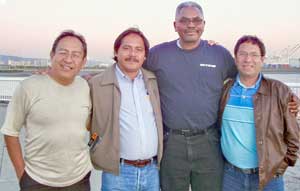Struggle knows no borders
Latin American labor unionists tour U.S.
By
Cheryl LaBash
Published Oct 22, 2008 5:17 PM
Two union leaders from Latin America recently shared an impressive story of the
gains for working and Indigenous people with workers and community activists
across the U.S.
|
Left to right: tour organizer Ignacio Meneses,
Fredy Franco, ILWU leader Clarence
Thomas
and Oscar Penagos during Oakland visit.
WW photo: Cheryl LaBash
|
From Sept. 30 to Oct. 14 Fredy Franco, Sec.-Gen. of Nicaraguan University
Professors, and Oscar Penagos, Sec.-Gen. of the telephone workers in
Bogotá, Colombia, and a delegate to the Central Workers Union, met with
service workers, students, rank-and-file fighters and elected officials.
The union/community collaboration in action organized in Boston (read Oct. 16
article at www.workers.org); New York;
Raleigh, N.C.; Detroit; Oakland and Los Angeles, Calif.; Washington, D.C.;
Chicago; and Toledo, Ohio, corresponded with a declaration of Latin American
unions that met in Quito, Ecuador, in May 2008.
New economic priorities that put the poorest and most marginalized first over
profit mean that education, work and health care are guaranteed rights for all
in a growing number of Latin American nations. However, a few
countries—Colombia, Peru and Mexico—are still locked into the
neoliberal imperialist economic order. Already in 2008 nearly fifty Colombian
union leaders have been assassinated by paramilitaries paid by U.S.
multinational corporations like Chiquita Brands, Drummond and Coca-Cola.
The snapshot of U.S. working-class issues and life explored during the tour
included the history of struggles for the eight-hour workday at Haymarket
Square in Chicago and against race and gender barriers at the Rosie the Riveter
monument in Richmond, Calif.
That struggle is not just history but is still very much alive. On the Oakland
docks, the Transport Workers Solidarity Committee and Million Worker March
Movement leaders from the Longshore Workers Union pledged to oppose Plan
Colombia.
These longshore workers reclaimed the May 1 holiday for U.S. workers in 2005
and shut down the West Coast docks in a “no peace, no work” 8-hour
strike on May 1, 2008, against the Iraq and Afghanistan occupations. On May 1,
2006, and again in 2007 millions of immigrant workers, mostly from Latin
America and especially Mexico, took to the streets demanding their full
rights.
On strike for more than 80 days, Moncure Plywood workers outside of Raleigh are
on the front lines of today’s fight to keep seniority rights and limit
hours of work. They are the face of the neoliberal offensive against workers in
the U.S., an offensive that workers in Latin America have also suffered but are
now successfully pushing back. Franco and Penagos pledged to the strikers to
tell their story throughout the U.S. and to their unions in Nicaragua and
Colombia, as well as ask the World Federation of Trade Unions to support their
struggle for justice and workers’ rights.
In every city, the touring union leaders met with immigrants forced to migrate
to the U.S. due to unlivable conditions in their homelands created by
“free trade” imperialist intervention that destroyed local
economies and opportunities for work.
In Toledo the Farm Labor Organizing Committee served dinner at a meeting for
Franco and Penagos where FLOC founder and president, Baldemar Velasquez, spoke
of defending immigrant rights and gave updates on the struggle for justice for
FLOC union organizer, Santiago Rafael, slain in Mexico.
The U.S./Cuba Labor Exchange will follow up this tour with the Dec. 5-7
International Labor Conference in Tijuana, Mexico, featuring families of the
“Cuban Five” unjustly held in U.S. prisons. For online registration
and information, visit laborexchange.blogspot.com.
The writer was on tour with the Latin American delegation.
Articles copyright 1995-2012 Workers World.
Verbatim copying and distribution of this entire article is permitted in any medium without royalty provided this notice is preserved.
Workers World, 55 W. 17 St., NY, NY 10011
Email:
[email protected]
Subscribe
[email protected]
Support independent news
DONATE


